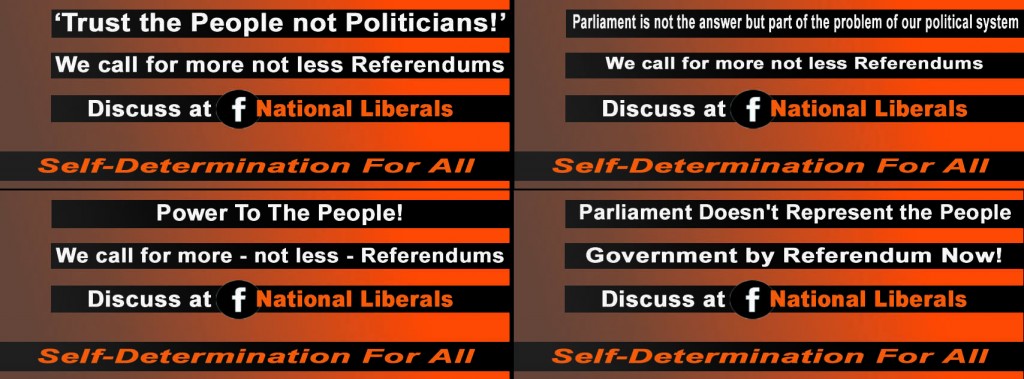Democratic Denial (Part 1)

.
“ONCE MORE let me remind you what fascism is. It need not wear a brown shirt or a green shirt – it may even wear a dress shirt. Fascism begins the moment a ruling class, fearing the people may use their political democracy to gain economic democracy, begins to destroy political democracy in order to retain its power of exploitation and special privilege.”
Tommy Douglas (1904 – 1986), Premier of Saskatchewan and the leader of the Canadian New Democratic Party.
.
FOR THE National Liberal Party – NLP – the main lesson from the Brexit vote is that Britain is totally divided over the result.
However, the main division is not down to the ‘usual suspects’ be they national, racial or class-based (although it could be argued they all were determining factors to some extent or another). Nor is it between ‘left’ and ‘right.’ The real division – the fault line – is between those who accept democracy and those who don’t. Indeed, this is currently manifesting itself as a battle between the people and the elites.
Professor Matthew Goodwin (who is Professor of Politics in the School of Politics and International Relations at the University of Kent) correctly described this battle like this:
‘Brexit was the first moment when a majority of people outside of parliament formally asked for something that a majority of people inside parliament didn’t want to give. And leavers knew exactly what they were voting for, as almost every study has shown, they wanted powers returned from the European Union and lower immigration. But many were also asking for something else: A radical shake-up of what they see is a broken settlement, a place where London gets a lot and everywhere else gets little, where left behind workers have good reason to feel left behind, and where all of us are right to worry about inequality, corporate power, and whether our politicians are even listening.’
However, the denial of democracy goes way beyond the result of the original People’s Vote of 23rd June 2016 – aka the United Kingdom European Union membership referendum, also known as the EU referendum, the European referendum and the Brexit referendum.
According to the Electoral Commission – https://www.electoralcommission.org.uk/who-we-are-and-what-we-do/elections-and-referendums/past-elections-and-referendums/eu-referendum/results-and-turnout-eu-referendum – 46,500,001 people were eligible to vote. Of these, 33,551,983 exercised their right to vote. This represented a massive turnout of 72.2% – one of the biggest exercises in participatory democracy the UK has ever seen. Of those who voted, 17,410,742 voted to leave the EU whilst 16,141,241 voted to remain.
We feel that – no matter what way individuals voted – the vast majority of the electorate would have expected Westminster to honour the result of the EU Referendum. As we all now know to our cost, Westminster is unwilling to acknowledge (and swiftly act upon) the popular will of the people. In layman’s terms, the entire electorate has been shafted.
• IN PART TWO of this series we’ll take a look at how the actions of Westminster – in denying democracy to the people – may impact on future elections. Indeed, how will the electorate view ‘democracy’ from now on in? We’ll also be offering various solutions (with specific reference to referendums) to this problem.
• DON’T FORGET to viral out our original e-posters via Social Media:
Trust The People – Not The Politicians! http://nationalliberal.org/trust-the-people-not-the-politicians
Parliament Is Not The Answer! http://nationalliberal.org/new-nlp-poster-parliament-is-not-the-answer
Power To The People! http://nationalliberal.org/power-to-the-people
Parliament Doesn’t Represent The People! http://nationalliberal.org/parliament-doesn’t-represent-the-people
Date: October 17, 2019
Categories: Articles































